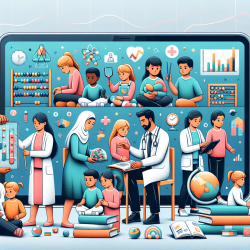Recent research published in BMC Pediatrics titled Is medical home care adequacy associated with educational service use in children and youth with autism spectrum disorder (ASD)? provides valuable insights into the relationship between medical home care and educational service use among children with ASD. As practitioners focused on creating positive outcomes for children, it is crucial to understand how the adequacy of medical home care can influence the utilization of educational services.
The study analyzed data from the 2016/2017 National Survey of Children’s Health, involving 1,248 children and youth with ASD. The researchers operationalized inadequate medical home care as negative or missing responses to at least one medical home component. Educational service use was defined as current service use under individualized family service plans (IFSP) and individualized education programs (IEP).
Key findings from the study include:
- Inadequate medical home care was significantly associated with a higher likelihood of current educational service use (aOR=1.95, 95% CI [1.10, 3.44], p=0.03).
- Older children (aOR=0.91, 95% CI [0.84, 0.99], p=0.03), lower maternal health (aOR=0.52, 95% CI [0.29, 0.94], p=0.03), and children without other special health care factors (aOR=0.38, 95% CI [0.17–0.85], p=0.02) had significantly lower odds of current educational service use.
These findings underscore the importance of adequate medical home care in facilitating access to educational services for children with ASD. As practitioners, here are some actionable steps to consider:
1. Ensure Comprehensive Medical Home Care
Medical home care should be accessible, continuous, comprehensive, family-centered, coordinated, compassionate, and culturally effective. Regularly evaluate your practice against these components to identify areas for improvement.
2. Foster Collaboration with Educational Service Providers
Effective coordination between medical home care providers and educational service professionals is essential. Establish clear communication channels and referral processes to streamline service delivery and reduce fragmentation.
3. Address Sociodemographic Barriers
Recognize and address barriers that may affect access to medical home care and educational services, such as socioeconomic status, race/ethnicity, and maternal health. Tailor interventions to meet the unique needs of diverse populations.
4. Promote Family-Centered Practices
Engage families as active partners in the care process. Provide them with the necessary resources and support to navigate both medical and educational systems effectively.
By implementing these strategies, practitioners can enhance the quality of care and improve educational outcomes for children with ASD. Future research should continue to explore the intricate relationship between medical home care and educational service use to inform evidence-based practices.
To read the original research paper, please follow this link: Is medical home care adequacy associated with educational service use in children and youth with autism spectrum disorder (ASD)?










